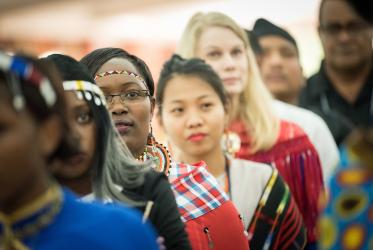by Marcelo Schneider*
The fifteenth of March 2017, marks the sixth year since the start of the Syrian war. Lebanon, being a small Middle Eastern country facing constant political and national unity challenges with a population of approximately 450,000 Palestinian and Iraqi refugees, has been the shelter for more than 2 million registered Syrian refugees since 2011.
The scale of this forced migration has no precedent in modern history of the Middle East. The number of Palestinian, Iraqi and Syrian refugees is estimated to be at a percentage of 32% of the Lebanese population, if not more.
Mira Neaimeh is from Lebanon. She is a member of the Orthodox Youth Movement being a member of the World Student Christian Federation (WSCF) and was one of the speakers of a World Council of Churches (WCC) co-sponsored side event “Empowering Refugee Women and Children through Education and Employment” at the 61st session of the Commission on the Status of Women held in New York on 13-24 March.
The side event was co-organized by the WCC, the US Fund for UNICEF and the Greek Orthodox Archdiocese of America.
In her presentation, Neaimeh highlighted the role of faith-based communities in providing aid to the refugees.
Facing the Syrian influx to Lebanon, Lebanese people are split: those who want to help no matter what, because humanity is what matters, and those who totally refuse the idea.
Given that the government was and still is unable to provide important contributions to the refugees - due to many social, economical, and political reasons - churches took the lead.
“Lebanon is the most religiously diverse country in the Middle East, having 18 different religions and confessions,” she said.
As the present Syrian crisis is still developing and spilling into Lebanon over the past six years, Lebanon is now the home of more than 3,000 Syrian Christian refugee families. Local churches are working more to reach beyond their comfort zones and social boundaries to help the refugees.
“But churches forget the important”, stated Neaimeh. “It has to remain a church and not a social service agency, for helping those in need is one of its main functions among all the others”, she added.
Following the occupation of Lebanon by Syria for 30 years, every Lebanese family, including Neaimeh’s, has stories of their homes being destroyed, family members killed and kidnapped. Thus, the decision by a handful of Lebanese Christians, including priests, practitioners and believers to reach out to Syrian refugees in Lebanon meant being able to forget the past and go on with what faith dictates and humanity loudly utters.
“Even if you decide, on a personal level, to help, you will face some major disagreement from your surroundings, such as family, neighbors and others in the same community, regarding your decision”, said Neaimeh, while sharing the example of one church where 85 percent of the members left a congregation because the priest decided to help the refugees.
Regardless of all the opposition, churches have decided to make their premises places of compassion for people of any faith to find help in the midst of the crisis. Regarding the Syrian crisis, the local church in Lebanon as an institution. In Syria, the local church as an institution in the community has enabled access to areas and to refugees and those affected by violence that would not have been possible otherwise.
“The embraced refugees are suffering from terrible hardships; many of them are in bad shape, emotionally and materially; for they are traumatized”, stated Neaimeh. “They left everything behind and came to Lebanon with literally nothing”.
Given the rise of Islamic extremism, and the Arab culture that focuses mainly on the tribe and family, churches tend most of the time to minister its help to those inside their communities, thus excluding those who are outside it. The latter makes the aid conditional to a certain group of people, rejecting the embracing act, and not showing them compassion.
“Christian refugee families have access to rented homes, sometimes with multiple families in a single home or a set of rooms. Although they are living in houses, these families lack the very basics of daily life, such as food, educational opportunities for their children and medical care”.
“Churches are helping the refugees pay their rent, and find work for the young men and adults, given that they are skilled laborers”, she said.
As for the role of WSCF, Neaimeh shared that although the ecumenical organization is not getting involved directly in the process of helping refugees, it has been encouraging and following up with the programs created by the member churches and other allied churches.
“WSCF, through its ‘Lebanon’s Committee’, which includes most of the churches in Lebanon, is in charge of pushing and supporting its member churches to carry out the necessary relief programs to the needy ones”.
“Lebanon needs such a coalition between its churches, in order to be compassionate, thus developing skills and capacities to provide the full range of social services”, added Neaimeh.
* Dr Marcelo Schneider is a communication officer for the World Council of Churches.
Solidarity with churches in the Middle East
WCC delegation seeks secure future for religious minorities in Iraq
The WCC and NCA report "The protection needs of minorities from Syria and Iraq”








